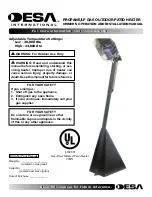
3
GENERAL SAFETY
INFORMATION
PRECAUTIONS
DO NOT USE THIS APPLIANCE IF ANY PART HAS BEEN
UNDERWATER. Immediately call a qualified service technician
to inspect the appliance and to replace any part of the control
system and any gas control which has been under water.
IF THE UNIT IS EXPOSED TO THE FOLLOWING, DO NOT
OPERATE HEATER UNTIL ALL CORRECTIVE STEPS HAVE
BEEN MADE BY A QUALIFIED SERVICEMAN.
1.
EXTERNAL FIRE.
2.
DAMAGE.
3.
FIRING WITHOUT WATER.
4
SOOTING.
Heater must be protected from freezing downdrafts during
shutdown periods.
GROUNDING INSTRUCTIONS
This water heater must be grounded in accordance with the
National Electric Code and/or local codes. These must be followed
in all cases.
This water heater must be connected to a grounded metal,
permanent wiring system; or an equipment grounding conductor
must be run with the circuit conductors and connected to the
equipment grounding terminal or lead on the water heater.
CHEMICAL VAPOR CORROSION
WARNING
CORROSION OF THE FLUEWAYS AND VENT SYSTEM MAY
OCCUR IF AIR FOR COMBUSTION CONTAINS CERTAIN
CHEMICAL VAPORS WHICH BREAK DOWN INTO ACIDS AT
HIGH TEMPERATURE. SUCH CORROSION MAY RESULT IN
FAILURE AND RISK OF ASPHYXIATION.
Spray can propellants, cleaning solvents, refrigerator and air
conditioning refrigerants, swimming pool chemicals, calcium and
sodium chloride (water softener salt), waxes, and process
chemicals and typical compounds which are potentially corrosive.
Do not store products of this sort near the heater. Also, air which
is brought in contact with the heater should not contain any of
these chemicals. If necessary, uncontaminated air should be
obtained from remote or outside sources. The limited warranty is
voided when failure of water heater is due to a corrosive
atmosphere. (Refer to the limited warranty for complete terms
and conditions).
IMPROPER COMBUSTION
WARNING
ATTIC AND/OR EXHAUST FANS OPERATING ON THE
PREMISES WITH A WATER HEATER CAN RESULT IN CARBON
MONOXIDE POISONING AND DEATH.
OPERATING OF THESE FANS CAN PRODUCE A DOWN
DRAFT IN THE AREA OF THE WATER HEATER PREVENTING
THE PRODUCTS OF COMBUSTION FROM EXHAUSTING
THROUGH THE CHIMNEY OR VENT PIPE.
The venting of the water heater should be inspected by a qualified
service technician at the time of installation and periodically
thereafter to ensure a down-draft condition does not exist.
DO NOT OBSTRUCT THE FLOW OF COMBUSTION AND
VENTILATING AIR. ADEQUATE AIR FOR COMBUSTION AND
VENTILATION MUST BE PROVIDED FOR SAFE OPERATION.
LIQUID PETROLEUM MODELS
Water heaters for propane or liquefied petroleum gas (LPG) are
different from natural gas models. A natural gas heater will not
function safely on LP gas and no attempt should be made to
convert a heater from natural gas to LP gas.
LP gas must be used with great caution. It is highly explosive
and heavier than air. It collects first in the low areas making its
odor difficult to detect at nose level. If LP gas is present or even
suspected, do not attempt to find the cause yourself. Ventilate
the area, then call your gas supplier or service agent. Keep area
clear until a service call has been made.
The presence of LP gas may be difficult to detect. The use of a
propane gas detector is recommended.
Only trained LP professionals should conduct the required safety
checks in accordance with industry standards.
EXTENDED NON-USE PERIODS
WARNING
HYDROGEN GAS CAN BE PRODUCED IN A HOT WATER
SYSTEM SERVED BY THIS HEATER THAT HAS NOT BEEN
USED FOR A LONG PERIOD OF TIME (GENERALLY TWO
WEEKS OR MORE). HYDROGEN GAS IS EXTREMELY
FLAMMABLE.
To reduce the risk of injury under these conditions,
it is recommended that a hot water faucet be opened for several
minutes before using any electrical appliance connected to the
hot water system. If hydrogen is present, there will probably be
an unusual sound such as air escaping through the pipe as the
water begins to flow.
THERE SHOULD BE NO SMOKING OR
OPEN FLAME NEAR THE FAUCET AT THE TIME IT IS OPEN.
INSULATION BLANKETS
Insulation blankets available to the general public for external
use on gas water heaters are not approved for use on your A.O.
Smith water heater. The purpose of an insulation blanket is to
reduce the standby heat loss encountered with storage tank water
heaters. Your A.O. Smith water heater meets or exceeds the
ASHRAE/IES 90.1b-1992 standards with respect to insulation and
standby loss requirements making an insulation blanket
unnecessary.
WARNING
The application of an insulation blanket will void the warranty for
this water heater. Furthermore, the application of an insulation
blanket may interfere with the operation of this water heater,
possibly resulting in property damage, injury, or death.
HIGH ALTITUDE INSTALLATIONS
Your A.O. Smith water heater has been designed to operate at
altitudes above 2000 feet, provided that requirement was specified
at the time of order. The firing rate will be specified on the water
heater rating plate.


































